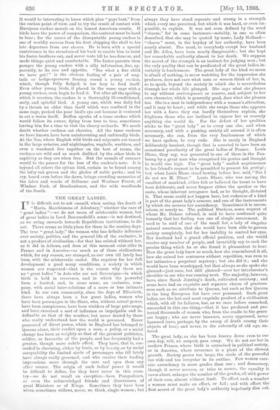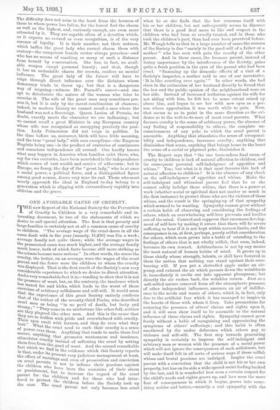THE GREAT LADIES.
IT is difficult not to ask oneself, when noting the death of " Maria, Marchioness of Ailesbury," whether the race of
" great ladies "—we do not mean of aristocratic women, but of great ladies in Lord Beaconsfield's sense—is not destined, as we swing onwards towards Republican institutions, to die out. There seems so little place for them in the coming days. The true " great lady," the woman who has definite influence over society, politics, and the general life of the exclusive, is not a product of civilisation—for that has existed without her, as it did in Athens, and does at this moment exist alike in France and in America—so much as of those civilisations which, for any reason, are stamped, as our own till lately has been, with the aristocratic cachet. She requires for her full development a good many conditions, a society in which women are respected—that is the reason why there are no " great ladies " in Asia who are not Sovereigns—in which birth is held in reverence, and in which the powerful form a limited, and, in some sense, an exclusive, com- pany, with social inter-relations of a more or less intimate kind. In our own community, since the days of Elizabeth, there have always been a few great ladies, women who have been personages in the State, who, without actual power, have been conspicuous, have been wielders of large patronage, and have exercised a sort of influence as impalpable and in- definable as that of the weather, but never denied by those who really understand how the world is governed. Never possessed of direct power, which in England has belonged to Queens alone, their verdict upon a man, a policy, or a social change has been as weighty as that of the greatest politician, soldier, or favourite of the people, and has frequently had a greater, though more subtle effect. They have, that is, suc- ceeded in charming, either by brain, or by beauty, or by social acceptability the limited circle of personages who till lately have always really governed, and who receive their leading impressions more through the ears and eyes than any other source. The origin of such ladies' power it would be difficult to define, for they have never in this coun- try—we do not recall an exception—been Pompadours, or even the acknowledged friends and directresses of great Ministers or of Kings. Sometimes they have been wives; sometimes widows, never, we think, single women ; but always they have stood separate and strong in a strength which every one perceived, but which it was hard, or even im- possible, to explain. It was not even defined by the word "charm," for in some instances—notably, in one so often described, that she may be quoted by name, Lady Holland- " charm " must, in the heyday of her authority, have been nearly absent. She must, to everybody except her husband and Mr. Allen, have been nearly disagreeable ; but she kept her remarkable authority almost to her death. We suppose the secret of the strength is an instinct for judging men ; but the only quality that can be predicated of the great ladies in- variably is fearlessness. The great lady of the kind we mean is afraid of nothing, is never watching for the impression she produces, does not care what men or women think of her, is, so to speak, beyond the society in which she is nevertheless through her whole life plunged. She says what she pleases to say without arrare-pensge or reserve, and, subject to her own character, which is generally good, does what she pleases too. She is a man in independence with a woman's attraction, and it may be heart ; and while she sways those who approve her with a force they can hardly themselves explain, she frightens those who are inclined to oppose her as scarcely anything else would do. For the defect of her qualities sticks to the " great lady " as to every one else, and when necessary, and with a pushing society all around it is often necessary, she can, from the very fearlessness of which we have spoken, be very rude. She is rarely in England deliberately insolent, though that is asserted to have been an occasional peculiarity of the great ladies of France. Louis Blanc, they say, was presented to one of them in the Fau- bourg by a great man who recognised his genius and thought he would rise high. The " great lady " smiled acquiescence to her friend's request to be permitted to present his protege; but when Louis Blanc stood bowing before her, said, "But I do not see M. Blanc." Louis Blanc, who was among the smallest of mankind, either felt or believed the taunt to have been deliberate, and never forgave either the speaker or the caste, whose inherent arrogance had, as he thought, dictated it. That scene could not happen here, but rudeness of a kind is part of the great lady's armour, and one of the instruments by which she secures her ascendancy. Sometimes it is uncon- scious, or nearly so. The political Duchess, some request of whose Mr. Delane refused, is said to have confessed quite honestly that her feeling was one of simple amazement. It used to be said of one of the small list, a lady of singular natural sweetness, that she would have been able to govern society completely, but for her inability to control her eyes. Her husband had a grand official position, and she would receive any number of people, and invariably say to each the precise thing which he or she found it pleasantest to bear. How the great lady knew so much, how she remembered it all, how she coined her sentences without repetition, was even to her intimates a perpetual mystery ; but she did it ; and she would have been worshipped, but that always as she spoke she glanced—just once, but still glanced—over her interlocutor's shoulder to see who was coming next. The majority, however, have, since Sarah Jenning's death, cultivated courtesy ; and some have had an exquisite and separate charm of gracious- ness such as we attribute to Queens, but such as few Queens in the long European list have ever possessed. Such great ladies are the last and most exquisite product of a civilisation which, with all its failures, has, as we once before remarked, succeeded in this one thing,—that it has produced and pro- tected thousands of women who, from the cradle to the grave are happy ; who are never insecure, never oppressed, never harassed (save, perhaps, by the swoop of death among their objects of love), and never, to the extremity of old age, un- loved.
The great lady, as she has been known down even to our own day, will, we suspect, pass away. We do not see her in modern France, where birth is ostracised in political society, or in America, where reverence is a plant of the slowest growth. Society grows too large, the circle of the powerful too wide and too irregular in its outline. Few women exer- cise ascendancy in more grades than one ; and democracy, though it never secures, or tries to secure, the equality it raves about, enlarges the number of the grades, all with power of their own, almost without limit. To affect such a number a woman must make an effort, or fail; and with effort the first secret of the great lady's authority hopelessly dies out. The difficulty does not arise in the least from the lowness of those to whom power has fallen, for the lowest feel the charm as well as the highest, and, curiously enough, are even more attracted by it. They are capable often of a devotion which, as it expects no reward or even recognition, is of the very essence of loyalty. It is their number, not their natures, which baffles the great lady who cannot charm them with oratory—the competent female orator always preaches—and who has no means of reaching so many at such a distance from herself by conversation. She has, in fact, no avail- able weapon except personal beauty ; and that, though it has an undeniable charm for crowds, confers no mental Influence, The great lady of the future will have to reign through direct influence over the dictators whom democracy tends to throw up ; but that is a dangerous way of reigning—witness Mr. Parnell's career—and one apt to deteriorate the nature of the woman who tries to exercise it. The wife of the great man may sometimes pos- sess it, but it is only by the rarest combination of chances ; Indeed, in modern history we cannot recall a case where the husband was not a Sovereign. Queen Louisa of Prussia, no eloubt, exactly meets the character we are indicating ; but we cannot recall a great Minister in any European country whose wife was recognised as occupying precisely the posi- tion. Lady Palmerston did not reign in politics. In the time before us, moreover, birth will have little meaning, and the true " great lady," with rare exceptions—the Empress Eugenie being one—is the product of centuries of continuous and conscious independence all around. Oae hardly knows what may happen in America when families exist there, who, say for two centuries, have been nourished in the independence which comes of vast wealth and armies of adherents ; but in Europe, we fancy, the day of the " great lady," who is at once
social power, a political force, and a distinguished figure among good women, draws very near its end. Those who most nearly approach the ideal in England today belong to a generation which is slipping with extraordinary rapidity into -oblivion and the grave.



































 Previous page
Previous page